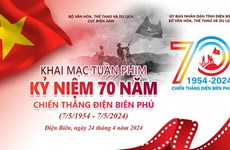Scholar Mai Quoc Lien recognised for literary research
Professor Mai Quoc Lien recently won the Balaban Award, which is
presented annually to individuals who contribute significantly to
preserving the Nom and Han-Nom ancient scripts. He speaks with Vietnam
News about the study of classic Vietnamese literature.
Professor Mai Quoc Lien recently won the Balaban Award, which is
presented annually to individuals who contribute significantly to
preserving the Nom and Han-Nom ancient scripts. He speaks with Vietnam
News about the study of classic Vietnamese literature.
Professor Lien previously received a national science and technology award for research into the scholar and writer Ngo Thi Nham of the late Le dynasty (1427-1789). He has conducted many such studies, including "Nguyen Trai toan tap" (Complete works of Nguyen Trai), "Nguyen Du toan tap" (Complete works of Nguyen Du) and "Ngo Thi Nham-Tac pham" (Ngo Thi Nham-Works). He is currently the editor-in-chief of Hon Viet (Vietnamese Soul) magazine of the Vietnamese Writers' Association and director of the Research Centre for National Culture.
* You received the Balaban Award from the Vietnamese Nom Preservation Foundation on the 20th anniversary of the establishment of the Research Centre for National Culture. This must have doubled your happiness, right?
In my acceptance speech, I said that the study of Nom script [Vietnamese ancient script derived from ancient Han Chinese] is very difficult, much more difficult than Han ancient script. It is only used for ancient Vietnamese, which has a specific phonology and vocabulary.
There is still a lot of work ahead that requires us to double our efforts. Even though this award is given to an individual, it represents the efforts of a whole group of veterans who have dedicated the last 20 years to cultural research. Without the efforts of that group, no individual could have finished so many high-quality studies.
Furthermore, the monthly "Hon Viet" (Vietnamese Soul) magazine would not have released 74 issues without a community that shared the noble goal of preserving and promoting the ancestors' heritage.
* You studied Nguyen Du (1766-1820) and Ngo Thi Nham (1746-1803) for many years. In November, the UNESCO General Assembly honoured Nguyen Du as a World Cultural Celebrity. However, many believe that we can only understand Nguyen Du if we are at the same intellectual level. Do you agree with this opinion?
It is basically true. Understanding a complicated genius like Nguyen Du needs significant thought and knowledge. Since he passed away over 200 years ago, researchers have never stopped studying his work.
Intelligentsia, in my opinion, can only understand Nguyen Du if they understand the culture of ancient China and East Asia. They need to understand Chinese poet Du Fu (712 - 770), whom Nguyen Du honoured as the teacher and poet of generations. He said that his soul wandered into Du Fu's poems every night.
However, a normal person can also understand Nguyen Du, like illiterate mothers in the past whose hearts were absorbed with "Truyen Kieu" (The Tale of Kieu – an epic poem written by Nguyen Du recounting the life, trials and tribulations of Thuy Kieu, a beautiful and talented youngwoman, who had to sacrifice her love and life to save her family). "How tragic is women's fate". Some mothers even understand Nguyen Du better than the researchers. They penetrate the humanism in his poems.
* Many Vietnamese have learned by heart the 3,241st to 3,254th lines of verse in the Tale of Kieu. Some foreigners, like former US president Bill Clinton, have quoted lines from the tale when they visit Vietnam. Philosophies from Nguyen Du's works are also mentioned in other poems written before The Tale of Kieu. So why is Kieu often quoted in philosophies about life and the changes of time?
It would take a long time to do justice to this topic. To make it simple, let's consider The Tale of Kieu as a poetic fiction, both a poem and story. Every line in the work is so condensed and concise that it can be applied to any situation. For example, when Kieu reunites with Kim Trong (her first love), he wrote "bitter sorrow turned to sweeter love", which can also be used to describe the feelings of the former lovers when they get together again.
* You have studied both Nguyen Du and Ngo Thi Nham. Nguyen Du is 19 years younger than Ngo Thi Nham. Have you ever imagined a possible conversation between these two geniuses in the past, or even the present?
As far as I know, Ngo Thi Nham and Nguyen Du never met. Nguyen Du became renowned much later than Ngo Thi Nham, who was his predecessor. There are many differences between them. Ngo Thi Nham was a mandarin in the Tay Son dynasty (1788-1802), taking over important historical tasks for the country, like helping King Quang Trung (1753-1792) defeat Chinese Qing invaders and then establishing a relationship with them.
* In your opinion, what were Ngo Thi Nham's precious contributions to education?
Poet Che Lan Vien (1920-1989) said he believed that Ngo Thi Nham had more historical achievements than Nguyen Trai (1380-1442), who was better in terms of literature.
As we all know, Ngo Thi Nham had two grand achievements: helping the king to withdraw the army, then moving forward to the capital to defeat the enemy. His war strategies were very intelligent and useful. After that, he held a position equivalent to the current Minister of Foreign Affairs. His diplomatic capacity was demonstrated by his contact with the Qing monarch and mandarins. He also showed determination and flexibility in exchanging letters with the former foe to heighten Vietnam's sovereignty while maintaining neighbourliness between the two nations.
* Can any of his diplomatic policies be applied to current relations between Vietnam and neighbouring countries?
Of course, a lot can be learned from his policies. Ngo Thi Nham was not only an outstanding politician and diplomat, but also a great contributor to national literature and philosophy. We have finished translating the collection of Ngo Thi Nham's works, consisting of five volumes published by the Publishing House of Literature. Anyone who is interested in ancient literature and Ngo Thi Nham's works will certainly find that his literature is very noble due to its splendour, elegance and conciseness.-VNA
Professor Lien previously received a national science and technology award for research into the scholar and writer Ngo Thi Nham of the late Le dynasty (1427-1789). He has conducted many such studies, including "Nguyen Trai toan tap" (Complete works of Nguyen Trai), "Nguyen Du toan tap" (Complete works of Nguyen Du) and "Ngo Thi Nham-Tac pham" (Ngo Thi Nham-Works). He is currently the editor-in-chief of Hon Viet (Vietnamese Soul) magazine of the Vietnamese Writers' Association and director of the Research Centre for National Culture.
* You received the Balaban Award from the Vietnamese Nom Preservation Foundation on the 20th anniversary of the establishment of the Research Centre for National Culture. This must have doubled your happiness, right?
In my acceptance speech, I said that the study of Nom script [Vietnamese ancient script derived from ancient Han Chinese] is very difficult, much more difficult than Han ancient script. It is only used for ancient Vietnamese, which has a specific phonology and vocabulary.
There is still a lot of work ahead that requires us to double our efforts. Even though this award is given to an individual, it represents the efforts of a whole group of veterans who have dedicated the last 20 years to cultural research. Without the efforts of that group, no individual could have finished so many high-quality studies.
Furthermore, the monthly "Hon Viet" (Vietnamese Soul) magazine would not have released 74 issues without a community that shared the noble goal of preserving and promoting the ancestors' heritage.
* You studied Nguyen Du (1766-1820) and Ngo Thi Nham (1746-1803) for many years. In November, the UNESCO General Assembly honoured Nguyen Du as a World Cultural Celebrity. However, many believe that we can only understand Nguyen Du if we are at the same intellectual level. Do you agree with this opinion?
It is basically true. Understanding a complicated genius like Nguyen Du needs significant thought and knowledge. Since he passed away over 200 years ago, researchers have never stopped studying his work.
Intelligentsia, in my opinion, can only understand Nguyen Du if they understand the culture of ancient China and East Asia. They need to understand Chinese poet Du Fu (712 - 770), whom Nguyen Du honoured as the teacher and poet of generations. He said that his soul wandered into Du Fu's poems every night.
However, a normal person can also understand Nguyen Du, like illiterate mothers in the past whose hearts were absorbed with "Truyen Kieu" (The Tale of Kieu – an epic poem written by Nguyen Du recounting the life, trials and tribulations of Thuy Kieu, a beautiful and talented youngwoman, who had to sacrifice her love and life to save her family). "How tragic is women's fate". Some mothers even understand Nguyen Du better than the researchers. They penetrate the humanism in his poems.
* Many Vietnamese have learned by heart the 3,241st to 3,254th lines of verse in the Tale of Kieu. Some foreigners, like former US president Bill Clinton, have quoted lines from the tale when they visit Vietnam. Philosophies from Nguyen Du's works are also mentioned in other poems written before The Tale of Kieu. So why is Kieu often quoted in philosophies about life and the changes of time?
It would take a long time to do justice to this topic. To make it simple, let's consider The Tale of Kieu as a poetic fiction, both a poem and story. Every line in the work is so condensed and concise that it can be applied to any situation. For example, when Kieu reunites with Kim Trong (her first love), he wrote "bitter sorrow turned to sweeter love", which can also be used to describe the feelings of the former lovers when they get together again.
* You have studied both Nguyen Du and Ngo Thi Nham. Nguyen Du is 19 years younger than Ngo Thi Nham. Have you ever imagined a possible conversation between these two geniuses in the past, or even the present?
As far as I know, Ngo Thi Nham and Nguyen Du never met. Nguyen Du became renowned much later than Ngo Thi Nham, who was his predecessor. There are many differences between them. Ngo Thi Nham was a mandarin in the Tay Son dynasty (1788-1802), taking over important historical tasks for the country, like helping King Quang Trung (1753-1792) defeat Chinese Qing invaders and then establishing a relationship with them.
* In your opinion, what were Ngo Thi Nham's precious contributions to education?
Poet Che Lan Vien (1920-1989) said he believed that Ngo Thi Nham had more historical achievements than Nguyen Trai (1380-1442), who was better in terms of literature.
As we all know, Ngo Thi Nham had two grand achievements: helping the king to withdraw the army, then moving forward to the capital to defeat the enemy. His war strategies were very intelligent and useful. After that, he held a position equivalent to the current Minister of Foreign Affairs. His diplomatic capacity was demonstrated by his contact with the Qing monarch and mandarins. He also showed determination and flexibility in exchanging letters with the former foe to heighten Vietnam's sovereignty while maintaining neighbourliness between the two nations.
* Can any of his diplomatic policies be applied to current relations between Vietnam and neighbouring countries?
Of course, a lot can be learned from his policies. Ngo Thi Nham was not only an outstanding politician and diplomat, but also a great contributor to national literature and philosophy. We have finished translating the collection of Ngo Thi Nham's works, consisting of five volumes published by the Publishing House of Literature. Anyone who is interested in ancient literature and Ngo Thi Nham's works will certainly find that his literature is very noble due to its splendour, elegance and conciseness.-VNA












